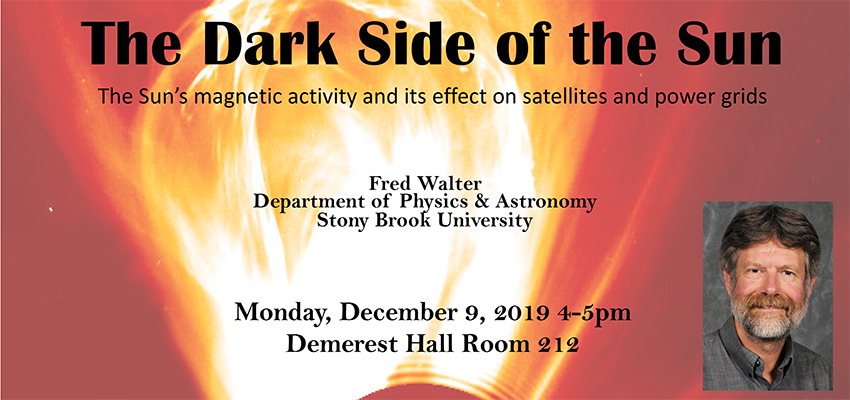
HWS News
3 January 2020 • Faculty • STEM Solar Magnetic Activity May Impact Infrastructure
In a lecture given at HWS in December, Professor Frederick M. Walter of the Department of Physics and Astronomy at Stony Brook University, N.Y. highlighted the risks facing America's power grid due to the sun's magnetic activity.
His talk, titled "The Dark Side of the Sun: The Sun's Magnetic Activity and Its Effect on Satellites and Power Grids," was hosted by the Richard S. Perkin Observatory and the Physics and Astronomy Club.
Walter's talk focused on extreme events called coronal mass ejections and solar proton events, which send highly energetic and charged particles toward earth. "The charged particles induce current in our power lines that if strong enough can overload and melt transformers," says Associate Professor of Physics Leslie Hebb, who helped plan the lecture.
"Most of the time," said Walter in his presentation, the Earth's magnetic field provides protection from the particles, but a strong event causing a large number of charged particles to move rapidly toward Earth could bring down the entire North American power grid. Events of this magnitude happen roughly every 300 years, and there is little way of knowing beforehand when one will occur."
Hebb agrees with Walters interpretation of the events, but says there are ways the power grid in the U.S. could be protected, at least partly, from damage. "One weakness in our infrastructure with regard to this threat is the interconnectedness of the North American power grid; we could install devices that disconnect transformers from one another in the event of large power surges before the induced current destroys the transformer," she says.
A stellar astronomer, Walter studies the magnetic activity of young and unusual stars, not the sun. He has taught astronomy at Stony Brook University since 1989. His professional interests include star birth, stellar weather, and star death using the CHANDRA and XMM-NEWTON X-ray Observatories, the Hubble Space Telescope, and telescopes in Arizona, Hawaii and Chile. Walter is a graduate of Massachusetts Institute of Technology and University of California at Berkeley.
